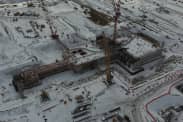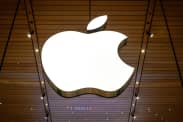The long, strange saga of Evergrande Group appeared to enter its final chapter Monday, with a Hong Kong court ordering China’s troubled property-development giant to liquidate after failing to reach a restructuring deal with creditors.
A key question for investors around the world is what Evergrande’s long-awaited demise means for China’s economy and financial markets. The answer: It doesn’t help the world’s second-largest economy, extending a long-run drag from the beleaguered property development sector on growth.
“Our take is that Evergrande’s liquidation will be yet another headwind to nominal activity,” Arif Haque, an analyst at Piper Sandler, said in a Monday note.
Haque said that a 1% year-over-year decline in real-estate investment has had a drag of 0.3 percentage points on China’s nominal gross domestic product. Over the past year, real-estate investment has plunged 16%, which translates into a nominal hit to GDP of 5 percentage points.
“Put differently, this property drag explains why GDP growth has shifted down from 10% to closer to 5%,” Haque wrote.

Chinese stocks have tumbled to begin the new year, with the Shanghai Composite CN:SHCOMP off 3.1% so far in January, the China CSI 300 XX:000300 down 3.7% and Hong Kong’s Hang Seng Index HK:HSI off 5.7%.
The Hang Seng hit a 14-month low last week, while the CSI traded near a four-year low, with weakness tied to worries about the property sector, sluggish growth and cool U.S.-China relations.
Chinese stocks moved off lows last week after news reports said authorities are weighing measures aimed at rescuing its ailing equity markets.
Related: This market is a ‘bear trap’ so here’s what to buy, strategist says
Haque said that along with the drag from construction spending, the real-estate-related wealth effect will be a “stiff headwind” to consumer confidence because much of China’s consumer net worth is tied up in housing.
Piper Sandler’s purchasing manager index model — purchasing managers index are gauges that track economic activity — shows lower economic inertia, Haque said, indicating Beijing will need to continue to ease policy.
The analyst recommended keeping a close eye on how China’s yuan currency holds up as it moves to provide stimulus. The yuan has moved largely sideways versus the U.S. dollar
USDCNY,
Peoples Bank of China Gov. Pan Gongsheng said at a press briefing last week that the reserve requirement ratio for banks would be cut by 0.5 percentage points on Feb. 5. Reducing the RRR, which determines how much cash banks must keep in their reserves, should provide 1 trillion yuan ($139 billion) in long-term liquidity to the market, Gongsheng said.
“Obviously, Beijing wants a stable yuan, so last week’s RRR cut and related currency stability is good news for the government,” Haque wrote.







